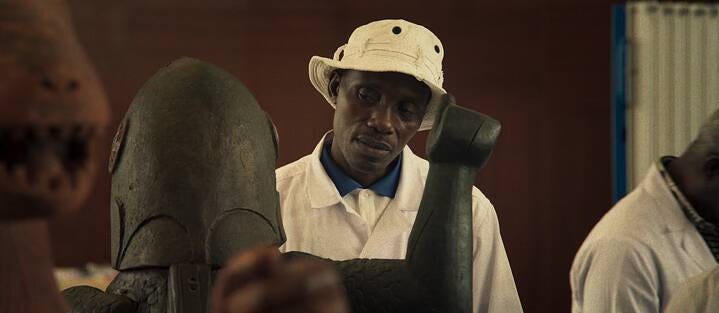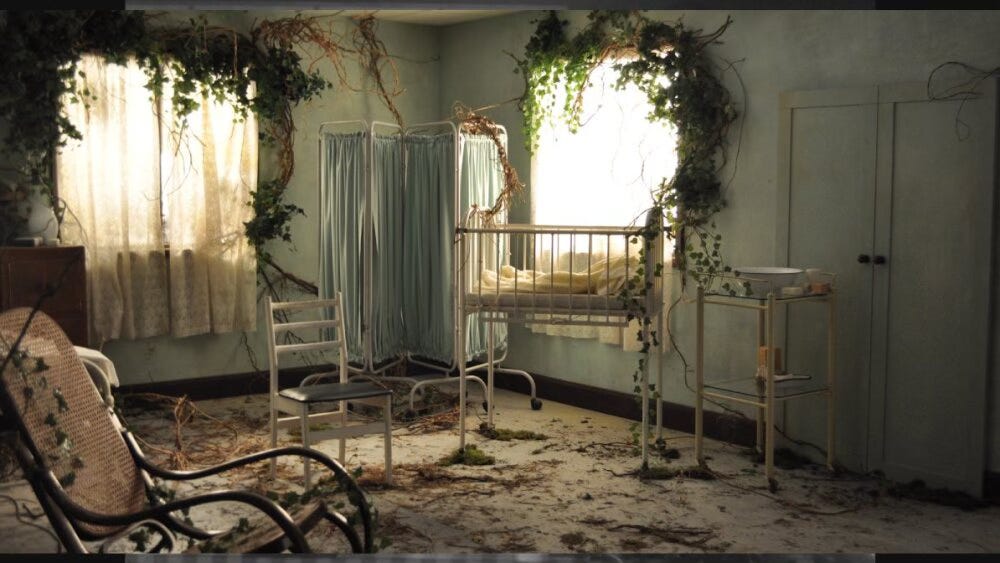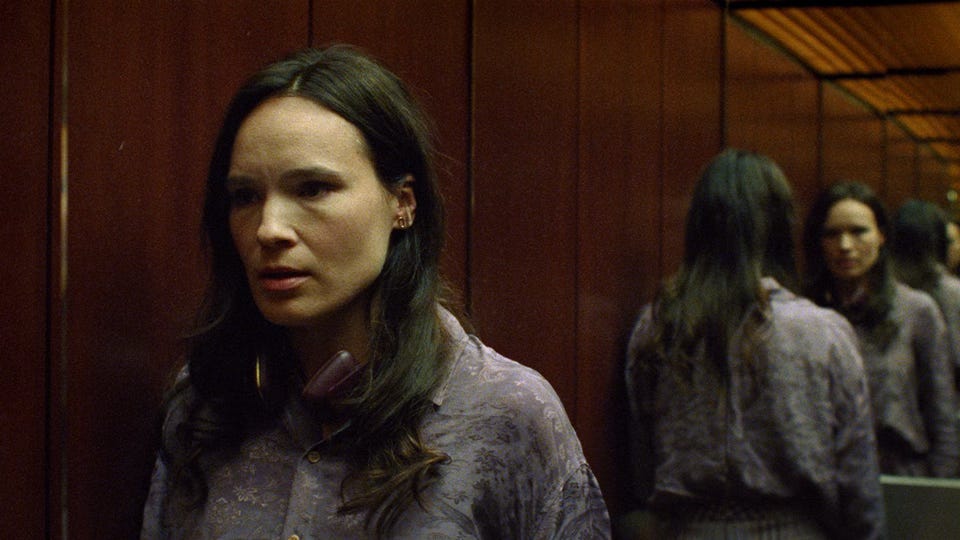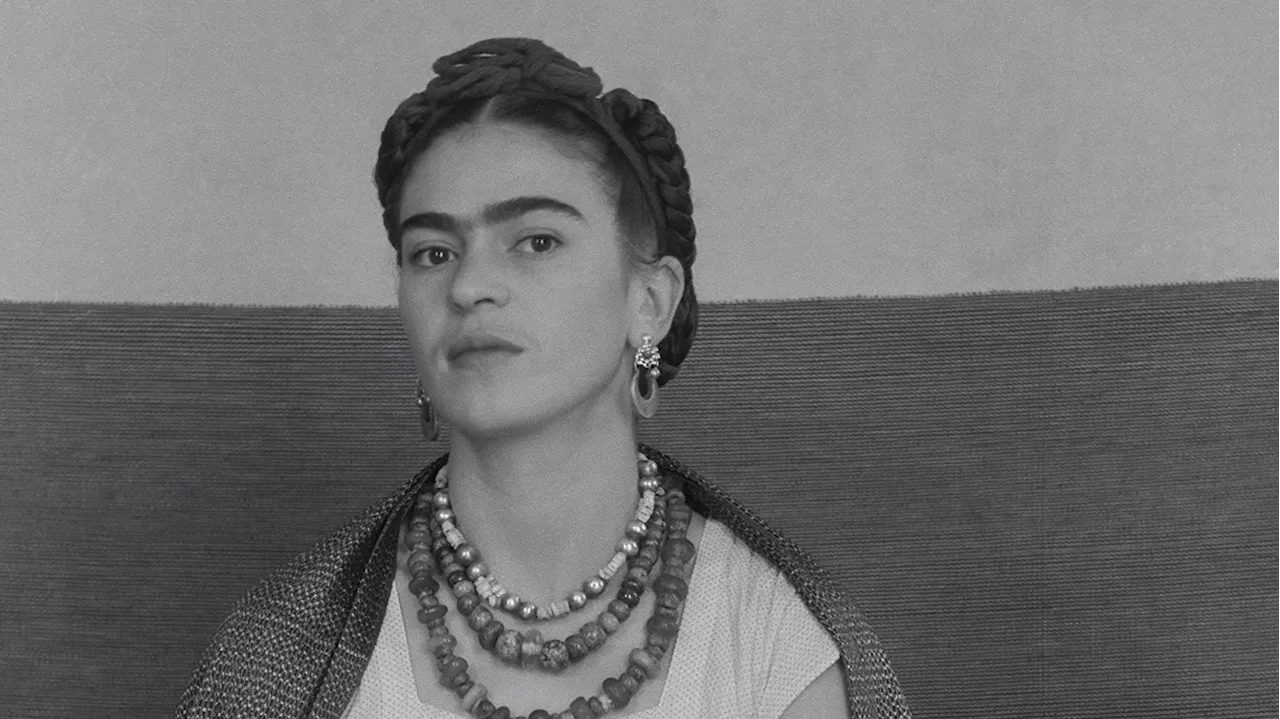This month’s picks are all films with short running times. I don’t know about you, but I’m having a hard time focusing on anything but the news. It’s beyond distressing to see the Trump administration destroy decades of institutional knowledge and research as they rampage through the federal government, hollowing out a work force that keeps the United States functioning. This isn’t a political newsletter and maybe you’re here for a break from all that, but I just feel the need to acknowledge the political crisis at hand and how it is affecting my attention span. I’ve been trying to keep up with the news but also to take breaks with movies, music, and books.
Speaking of taking a break…last night I watched Bridget Jones: Mad About the Boy, which is now streaming on Peacock. It felt very cozy to be back with Bridget and the gang and though it was a nostalgic watch, with lots of winks to the original, it had a mellow, slightly melancholy vibe that felt appropriate for older characters who have been through it. The actors were great all around, everyone seemed happy to be there. I don’t know what else to say, except that this movie was surprisingly good.
Here are a few more recommendations for you, including several Oscar-nominated short films. See you in March—unless you are a paid subscriber, in which case I’ll be back later this month with my favorite movies of 2024.
Dahomey (2024)
Directed by Mati Diop
1 hour 8 minutes; Streaming on Mubi/VOD $5.99
Director Mati Diop pivots to documentary after her acclaimed debut feature, Atlantics, this time tackling the subject of repatriation. The film begins in darkness as we hear the voice of what turns out to be the inner monologue of a statue, an artwork that French colonists stole from the Kingdom of Dahomey, an area in West Africa now located in the Republic of Benin. The large wooden statue was one of 26 artworks that France returned to Benin in 2021, a transition Diop imagines as both liberating and confusing for the statue. From the inner life of the artwork, Diop jumps to logistics: we see the statue being packed for transit in the basement of the museum, workers moving it carefully with gloved hands. Diop then shows us the politics of repatriation, bringing us into a school where a lively group of students debate what it means to return plundered artwork to a postcolonial society. Finally, we see the artwork in its new home, another museum. Diop packs a lot of ideas into seventy minutes and when I was finished, all I wanted to do was watch more documentaries. (Which is why you are going to find a lot of docs in this month’s post.) IMBD * REVIEW * TRAILER
Witches (2024)
Directed by Elizabeth Senkey
1 hour 30 minutes; Streaming on Mubi
This documentary is essayistic, braiding together personal narrative, film studies, and original research about the witch trials in early modern Europe. The personal narrative comes from British director Elizabeth Senkey, who suffered severe postpartum depression after the birth of her first child. She found sanctuary in a hospital wing for postpartum mothers and their infants, designed so that both mothers and babies could receive care. There, Senkey met other mothers in crisis, and we hear from several of them in this documentary; some of them speaking publicly for the first time. Senkey frames and illustrates these testimonials with images of witches in popular films, starting with The Wizard of Oz and its archetypal “good” witch and “bad” witch. Senkey’s emotional connection to witches seems at first like a general affinity for all things witchy, but by the end of the film she asserts a startling theory that links the persecution of witches to postpartum psychosis. IMBD * REVIEW * TRAILER
I’m Not a Robot (2024)
Directed by Victoria Warmerdam
22 minutes; Streaming on New Yorker and YouTube
Have you ever failed a captcha test—you know, those little puzzles that ask you to click all the photos with motorcycles, to prove you’re not a robot? This Oscar nominated live action narrative short is about a woman whose encounter with an online test makes her question everything she thought she knew about herself and her family. It’s exactly the kind of speculative sci-fi story I like, reminiscent of Black Mirror and Severance. IMDB * New Yorker link * YouTube link
The Only Girl in the Orchestra (2024)
Directed by Molly O’Brien
34 minutes; Streaming on Netflix
This Oscar nominated short documentary film is a charming profile of bassist Orin O’Brien, the first women to join the New York Philharmonic. Hired by Leonard Bernstein in 1966, O’Brien had to put up with the attention that came with being the first woman, including sexist comments from the press and sometimes her fellow musicians. It was especially dispiriting for O’Brien who chose the double bass, in part, because it wasn’t a solo instrument; she wanted to disappear into the orchestra. But she persevered, retiring from performance only recently. O’Brien continues to take on students and has a remarkably youthful demeanor. Her niece, director Molly O’Brien, who we see in conversation with her aunt, notes that O’Brien has handled aging better than anyone she knows. IMDB * REVIEW * TRAILER
Instruments of a Beating Heart (2024)
Directed by Ema Ryan Yamazaki
23 minutes; Streaming on New York Times
Here’s one more Oscar-nominated short, also focused on music, that peers into a Japanese elementary school where a group of first graders are preparing a rendition of “Ode to Joy.” The doc focuses on one little girl who really, really wants to play the cymbals. My heart went out to her, maybe because I also have a first grader. It’s also interesting to get a glimpse into the Japanese school system and to see how the expectations for children differ across cultures. IMBD * NYTimes Link
Frida (2024)
Directed by Carla Gutierrez
1 hour 27 minutes; Streaming on Amazon
If you already know a lot about Mexican painter Frida Kahlo, this documentary may be too basic for you, but I wasn’t as familiar with her biography, so I appreciated its straightforward approach. Using Kahlo’s diaries and letters as the primary text, we hear Kahlo’s life story in her own words. (The narration is in Spanish with English subtitles.) Kahlo’s writing is illustrated with her artwork and personal snapshots, as well as archival photographs from other sources. Sometimes Kahlo’s artwork is animated, which I didn’t like; it made her paintings feel a bit cutesy, and Kahlo is anything but. Fortunately, her salty diary entries more than made up for any tweeness. She’s funny and ruthless in her assessment of the United States and the moneyed art world she moved through with her husband, Diego Rivera. I came away from the film liking her artwork even more. IMBD * REVIEW * TRAILER
❤️ Link Love ❤️
R.I.P David Lynch. Critic Meaghan Garvey writes beautifully of the director’s love of cigarettes—on screen and off.
Justice for French actress Adèle Haenel in France’s first big #metoo case.
Director Elizabeth Sankey on five witch films that inspired her documentary.
Director Megan Park on what inspired her to write My Old Ass (one my favorite movies of 2024, don’t let the title throw you off).
Thank you for reading Thelma & Alice. If you enjoy my writing, here are some ways to show your support:
· Subscribe!
· Share this newsletter
· Like/comment/restack this post
· Borrow/buy/rate/review my latest novel, We Were Pretending










Thank you for these recommendations!